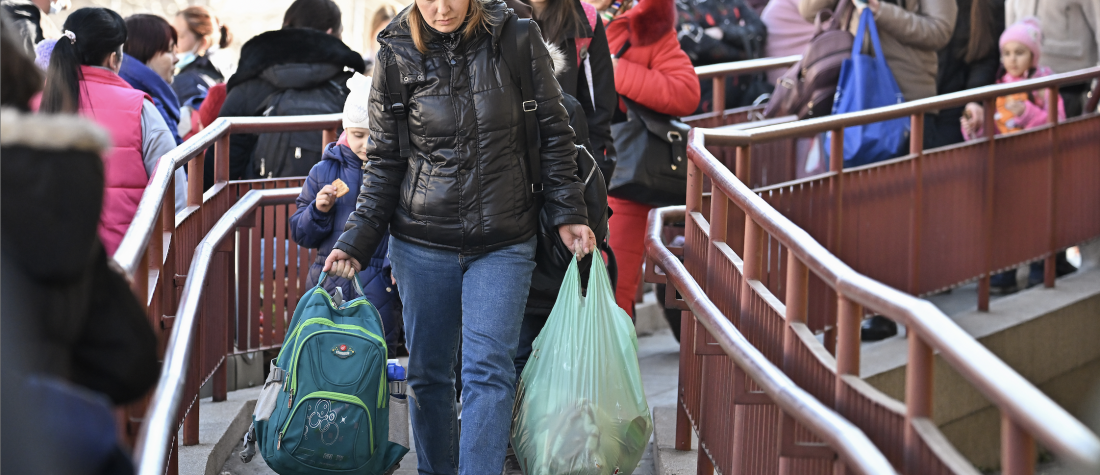Russia’s willingness to go to war in Ukraine surprised the West. The West’s response, though, likely surprised Russia.
The continent’s reaction has been remarkably different to previous instances of Russian aggression. Since the end of the Cold War, Europe has tended to struggle to reach a common view on how to handle the Eastern giant. Its response has often been limited to strongly worded statements and the adoption of sanctions. Not this time.
Europe’s response to the war has been uncharacteristically strong and united. Its main bloc, the EU, has agreed on massive sanctions and other restrictive measures on Russia, such as excluding several Russian and Belarusian banks from the Swift international payment system, banning Russian airlines from using the EU’s airspace and airports and suspending the broadcasting activities in the EU of Russian state-backed media outlets.
The EU has also agreed to provide Ukraine with a €450m financial support package through the ironically named European Peace Facility for the acquisition of lethal equipment and capabilities to help Ukraine defend its sovereignty. This is the first-time in history that the EU has agreed to provide lethal aid to a country fighting a war. It marks a dramatic shift in EU security and defence cooperation, which has so far focused on low-key crisis management operations and joint capability development projects.
The response of individual European countries has also been admirable. Many have welcomed Ukrainian refugees and provided defensive weapons to Kyiv. The UK, for example, has delivered anti-tank missiles, small arms and other equipment to Ukraine. Poland offered to transfer its fleet of Soviet era MiG-29 fighter jets to Kyiv, although this proposal has run into US resistance. Finland and Sweden are having serious national debates about joining Nato for the first time in their history.
Perhaps most strikingly, Germany has announced that it will increase its defence spending by €100bn, and that it will send anti-tank and anti-aircraft missiles to Kyiv. Berlin also decided to suspend the Nord Stream 2 pipeline project with Russia, long viewed in Berlin simply as an economic rather than a geopolitical project, which would have increased Europe’s dependence on Russian natural gas. These are dramatic departures from Germany’s established semi-pacifist post-war strategy.
In other words, Russia’s war against Ukraine has caused an unprecedented strategic awakening in Europe. What are the implications? First, any remaining trust that the Kremlin may have enjoyed in certain European capitals has evaporated. The Kremlin has made it clear that its words cannot be trusted and that it is prepared to use military force to achieve its goals. Europe’s threat perception vis-à-vis Moscow has become more homogeneous.
Second, security and defence will remain on Europe’s agenda for years to come. The war has given both Nato and the EU additional incentives to develop their respective competencies and capacities to enhance their ability to protect their members and their partners. Individual European countries will also find fewer political constraints to increasing their defence spending and boosting their national capacities, as Germany has already shown.
Third, the EU will be seen as a more credible security provider by its members. The way in which the Union has mobilised to support Ukraine also strengthens the EU’s internal crisis support and solidarity commitments such as Article 42(7) of the mutual aid and assistance clause of the Lisbon Treaty. If the EU can provide lethal assistance to a third country, chances are that its response would be even stronger if one of its own members were attacked.
Fourth, the EU’s value as a security provider will also increase in the eyes of its partners. This applies not only to countries in the Union’s neighbourhood but also to those further away such as in the Indo-Pacific, where the EU is seeking to play a more visible maritime security role. The UK and the EU will surely become closer. UK Foreign Secretary Liz Truss already participated in an EU foreign ministerial meeting in March, which suggests that at least some of the Brexit-related political obstacles may be being pushed aside.
Dr. Niklas Nováky is a Senior Research Officer at the Wilfried Martens Centre for European Studies


